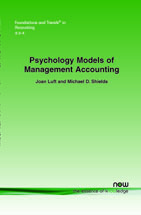Psychology Models of Management Accounting
By Joan Luft, Michigan State University, Department of Accounting & Information Systems, USA, luftj@msu.edu | Michael D. Shields, Michigan State University, Department of Accounting & Information Systems, USA, shields@msu.edu
Abstract
This review identifies subjective decision-making processes related to management accounting (MA) and uses these processes as a basis for organizing psychology-based research on MA. For each decision process we identify families of related psychology models that have supported robust theory-consistent empirical results. This MA literature addresses four main themes. First, individuals' subjective valuation of monetary payoffs often depends on frames (reference points) provided by MA, and frames can influence the use of MA information in decision making. Second, the subjective value of non-monetary (social) payoffs from sources such as fairness, honesty, reciprocity, social identity or affect influence and are influenced by individuals' MA-related decisions. Third, individuals' subjective models of MA-related decisions often incorporate predictable simplifications that influence and are influenced by MA. Fourth, MA can influence — sometimes bias or limit — individuals' learning, and learning influences MA, as individuals acquire parameter and variable values or the information to estimate them subjectively. We also identify two emerging themes and three gaps in the psychologybased MA literature.
Psychology Models of Management Accounting
Management accounting (MA) practices support a variety of organizational activities, including the design of incentive contracts, the allocation of resources, and the legitimization of power. Much research has focused on the role of MA in providing information for individuals to solve problems, formulate judgments, and make decisions. Psychology Models of Management Accounting analyzes the contributions of psychology-based research to explaining patterns in individuals' MA-related decision-making.
Psychology Models of Management Accounting reviews in detail the following four main themes: 1. framing and reference points. 2. individuals' valuation of non-monetary (social) payoffs. 3. subjective decision models. 4. limitations on learning. These four themes have been investigated extensively in the MA literature, yielding results that appear robust across specific MA decisions, decision makers, and settings.
In addition, Psychology Models of Management Accounting examines two additional themes that have emerged in this literature as recurring, but not always predicted, observations with important implications for future research – the limited heterogeneity of subjective decision models and whether subjective decisions are deliberative or intuitive (automatic or gut-feel).
